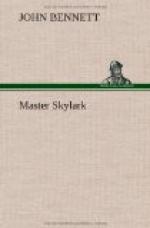Landing amid a deafening din of watermen bawling hoarsely for a place along the Paris Garden stairs, the master-player hurried up the lane through the noisy crowd. Some were faring afoot into Surrey, and some to green St. George’s Fields to buy fresh fruit and milk from the farm-houses and to picnic on the grass. Some turned aside to the Falcon Inn for a bit of cheese and ale, and others to the play-houses beyond the trees and fishing-ponds. And coming down from the inn they met a crowd of players, with Master Tom Heywood at their head, frolicking and cantering along like so many overgrown school-boys.
“So we are to have thee with us awhile?” said Heywood, and put his arm around Nick’s shoulders as they trooped along.
“Awhile, sir, yes,” replied Nick, nodding; “but I am going home soon, Master Carew says.”
“Carew,” said Heywood, suddenly turning, “how can ye have the heart?”
“Come, Heywood,” quoth the master-player, curtly, though his whole face colored up, “I have heard enough of this. Will ye please to mind your own affairs?”
The writer of comedies lifted his brows, “Very well,” he answered quietly; “but, lad, this much for thee,” said he, turning to Nick, “if ever thou dost need a friend, Tom Heywood’s one will never speak thee false.”
“Sir!” cried Carew, clapping his hand upon his poniard Heywood looked up steadily. “How? Wilt thou quarrel with me, Carew? What ugly poison hath been filtered through thy wits? Why, thou art even falser than I thought! Quarrel with me, who took thy new-born child from her dying mother’s arms when thou wert fast in Newgate gaol?”
Carew’s angry face turned sickly gray. He made as if to speak, but no sound came. He shut his eyes and pushed out his hand in the air as if to stop the voice of the writer of comedies.
“Come,” said Heywood, with deep feeling; “thou canst not quarrel with me yet—nay, though thou dost try thy very worst. It would be a sorry story for my soul or thine to tell to hers.”
Carew groaned. The rest of the players had passed on, and the three stood there alone. “Don’t, Tom, don’t!” he cried.
“Then how can ye have the heart?” the other asked again.
The master-player lifted up his head, and his lips were trembling. “’T is not the heart, Tom,” he cried bitterly, “upon my word, and on the remnant of mine honour! ’Tis the head which doeth this. For, Tom, I cannot leave him go. Why, Tom, hast thou not heard him sing? A voice which would call back the very dead that we have loved if they might only hear. Why, Tom, ’tis worth a thousand pound! How can I leave him go?”
“Oh, fie for shame upon the man I took thee for!” cried Heywood.




